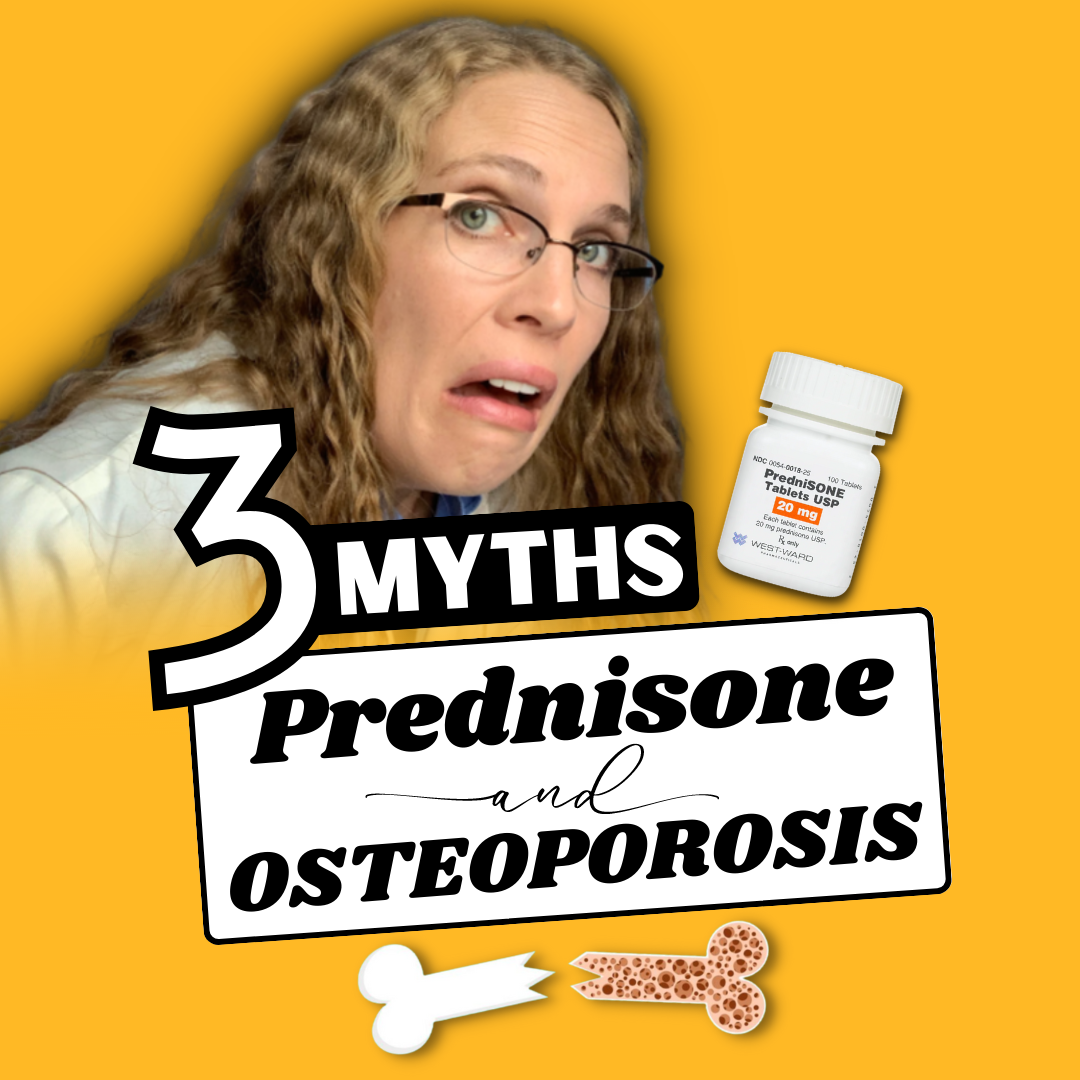3 Myths About Prednisone and Osteoporosis

What’s the number one drug that causes osteoporosis?
Prednisone is the top medication that contributes to bone loss and osteoporosis.
In this article, discover 3 myths about prednisone and osteoporosis that even I, as a pharmacist, believed before taking prednisone myself.
Watch now!
Top Drug Causing Osteoporosis
Prednisone is the 22nd most commonly prescribed medication, it’s given out by nearly every type of doctor. Treating mainly inflammatory and autoimmune conditions, prednisone miraculously allows people to live and breathe who are otherwise unable to.

The miracle prednisone causes comes with a cost, however. Like a “deal with the devil,” having prednisone stop a condition in its tracks can come at the expense of up to 150 side effects.
Remember Ariel, the Little Mermaid? She made a deal with the Sea Witch, Ursula, to turn her mermaid tail into legs so she could walk. This was a great deal until Ursula required Ariel’s gorgeous singing voice, the same voice that Prince Eric fell in love with earlier. Plus Ursula only gave her three days to make him fall in love with her!
Prednisone is like the Sea Witch. We can “walk” but lose other things, like Ariel’s voice.
One of the most shocking, yet silent side effects of prednisone is the bone loss leading to osteoporosis. The broken bones are practically the opposite of Ariel’s miracle: no longer being able to walk.
As a pharmacist, when I found out the doctor in the hospital prescribed me prednisone, I wanted to scream. I knew from the doctor of pharmacy training I’d received that prednisone comes with a host of side effects. I didn’t want to touch it with a 10-foot pole!
But nearly bleeding to death changed my mind quickly. The miracle of prednisone saving my life and stopping my body from attacking my own blood cells (platelets, with a diagnosis of ITP) made me so grateful prednisone exists.
Then the side effects set in. Along with the face-disfiguring “moon face,” many of the 150 side effects are reversible. I felt ugly and didn’t recognize myself in the mirror.
Irreversible Side Effects of Prednisone
What scared me the most, however, were the irreversible side effects that wouldn’t go away even when I stopped taking prednisone.
The most notable irreversible side effect of prednisone is osteoporosis.
What I thought I knew about prednisone causing osteoporosis that I’d learned from pharmacy school turns out to be not all I needed to know. I was surprised by several myths about prednisone causing osteoporosis.
3 Myths about Prednisone & Osteoporosis
1. Timing of Prednisone Causing Osteoporosis
I thought that the osteoporosis caused by prednisone wasn’t something to be concerned about until I’d been on prednisone for a long time. Since they originally prescribed only a few days’ worth of prednisone, I told myself not to worry about osteoporosis, since it couldn’t be a problem for me.
Turns out I was wrong. I found out that the most dramatic bone loss from prednisone is actually in the first three months of treatment. That was when I needed to be taking precautions the most and didn’t think I needed to.
But that doesn’t mean that those on prednisone long-term can rest easy, either. While the most dramatic loss is in the first three months, the loss continues steadily over time as well.
2. Type of Osteoporosis Consequences
I thought that the most likely problem for me, if I got osteoporosis from prednisone, would be breaking my hip. I perceived hip fractures as the most dangerous and therefore most likely to be a problem.
Again, I was wrong. The most common and therefore most likely consequence of prednisone osteoporosis is actually in the spine. Vertebral compression fractures are the most common. This means that the spine kind of squishes upon itself. You can’t feel it happening and often the only way you find out is if you measure your height and suddenly you are ½ inch or more shorter than you used to be.
3. Causes of Prednisone Osteoporosis
Prednisone is not the only drug like it. Prednisone is in a class of drugs called “glucocorticoids,” “corticosteroids” or “steroids,” which mimic our body’s natural hormone, cortisol. So any of the other glucocorticoids can cause osteoporosis as well, such as prednisolone, methylprednisolone, dexamethasone, and hydrocortisone.
I thought that there was only one way to prevent “Glucocorticoid-induced Osteoporosis.” Just take calcium and vitamin D, right? That’s the top recommendation from the doctors who prescribe prednisone the most, the rheumatologists, in their Guideline about how to treat this kind of osteoporosis.
Turns out I was wrong again! It’s not just calcium and vitamin D. It’s also several other nutrients that prednisone is stealing, leading to an imbalance in the nutrients we need for proper bone health.
I did a ton of research to further understand how prednisone depletes nutrients and found there are at least 9 nutrients that prednisone depletes. Each of these relate to prednisone’s other side effects, too!
If I as a pharmacist didn’t know all of this about how the #1 drug causes osteoporosis, and what I could do about it, there must be a lot more we can all learn.
Learn more in my interview by Bone Coach, Kevin Ellis.
Conclusion
Prednisone is a widely prescribed medication in the US, but it can lead to permanent bone loss, or osteoporosis. This process can start within the first three months of taking the medication and can cause pain and a decrease in height. To prevent this side effect, people on prednisone should increase their calcium intake and take Nutranize Zone, a supplement designed to replace depleted nutrients and to assist with other side effects such as headaches, irritability, and insomnia. Nutranize Zone can be bought online at Nutranize.com.
References
- American College of Rheumatology: Guideline for Prevention and Treatment of GIOP
- National Center for Biotechnology Information: Management of glucocorticoid-related osteoporotic vertebral fracture
- National Center for Biotechnology Information: Glucocorticoid-induced osteoporosis
Related Posts
-
3+ Prednisone Bone 🦴 Updates
In honor of Halloween weekend, I’ve got the latest updates for you when it comes... -
Prednisone for Back Pain
Did your doctor prescribe prednisone for low back pain? I’ve had low back pain. I’ve... -
Can Prednisone Prevent Osteoporosis?
It’s really fascinating to know that prednisone has these two sides of the same, like when it... -
Bone Coach Podcast Interview: This Med Causes Bone Loss & Osteoporosis
Bone Coach interviewed me all about Bone Loss and Osteoporosis from Prednisone. Find out how... -
Osteoporosis: Calcium & Prednisone Side Effects
The Silent Side Effect of Prednisone: Osteoporosis Often we are so distracted by the other... -
Exercise and Prednisone – Is it safe? What if I’m stuck in bed?
Exercise and Prednisone Can I exercise with prednisone? Is it safe? What if I’m stuck...


